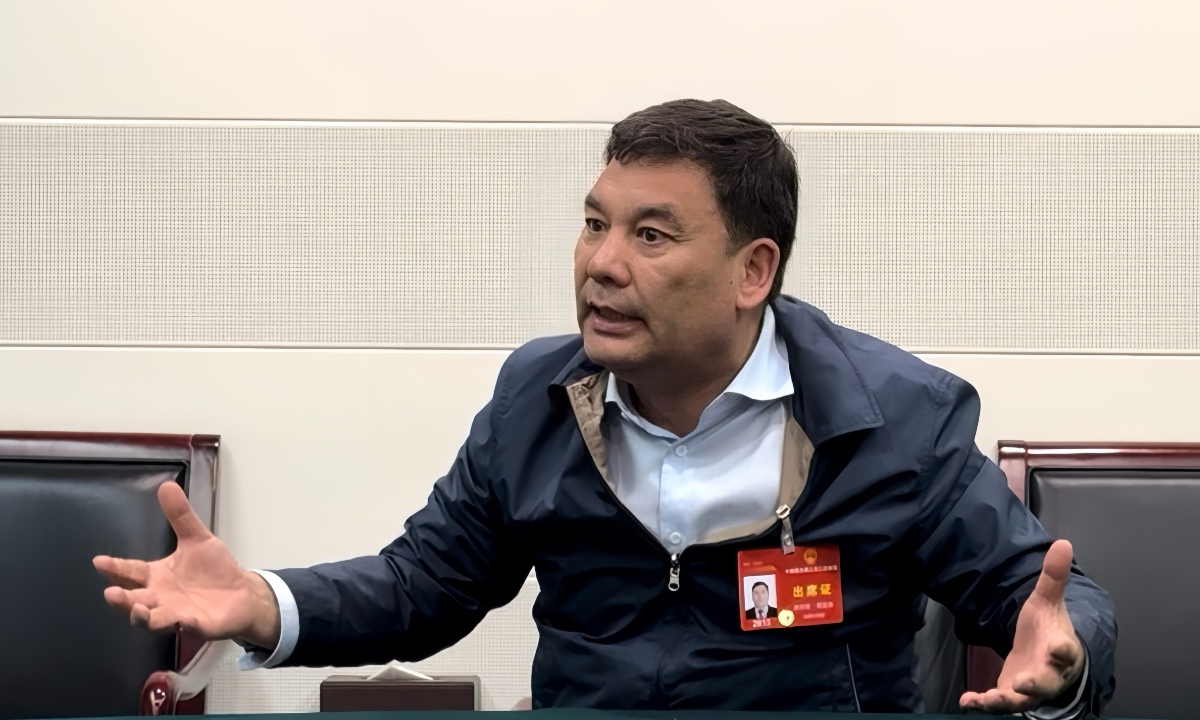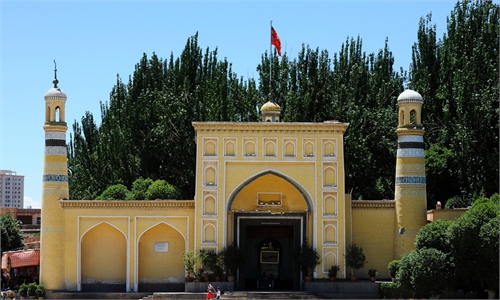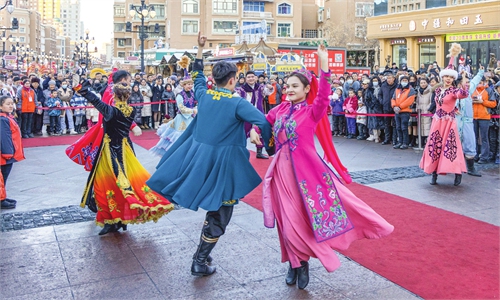US attempts to crack down on any industry that boosts Xinjiang’s prosperity: national lawmaker

Picture of Kurban Niyaz, a deputy to the 14th National People's Congress and a primary school principal in south Xinjiang. Photo: He Zhuoqian/GT
The US cannot tolerate stability and prosperity in China's Xinjiang Uygur Autonomous Region, and it is trying to resort to cracking down on every industry that is boosting the region's development, a lawmaker from the Xinjiang region told the Global Times, in response to US lawmakers pushing for a travel ban on the region and the continued hype of "forced labor" in Xinjiang.
In a letter to US Secretary of State Antony Blinken released on Thursday, a bipartisan group of US legislators is pushing the US State Department to escalate its travel advisory to Xinjiang to the highest risk level due to "ongoing crimes against humanity and genocide" and the Chinese government's promotion of tourism in the region, according to recent media reports.
"The US simply cannot tolerate a stable society and happy people in Xinjiang. They target any industry or issue that benefits the people in Xinjiang. They focus on cotton when the cotton industry booms; and [on] tourism when it's thriving. Their goal is to smear and disrupt Xinjiang in order to contain China's development," Kurban Niyaz, a deputy to the 14th National People's Congress (NPC) and a primary school principal in Xinjiang, said in an interview with the Global Times on Saturday.
In an open panel discussion during the ongoing second session of the 14th NPC on March 7, Akram Memtimin, an official from Saymahalla village in Xinjiang's Luntai county, said that "the alleged forced labor is sheer nonsense. I can use my own experience to explain it," in response to the false reports from certain foreign media outlets that have been promoting the fallacy of "forced labor" in Xinjiang's cotton industry.
The US has imposed sanctions on Xinjiang cotton products.
"Cotton is the main crop in our village. And last year, we planted over 506 hectares of cotton," Akram Memtimin said, noting that cotton farming has become more efficient as a result of technological advancements, such as the use of drones to spray pesticides and the installation of satellite navigation systems in cotton seeders.
Echoing Akram Memtimin, Niyaz said that there are large Uygur population communities in Xinjiang, so if there's forced labor, it will be widely known given the widely covered and highly developed social media. Yet he and people close to him have heard nothing about it.
The next time a new industry in Xinjiang takes off, the US will immediately intervene to seek to disrupt it. Its main goal is to prevent the people of Xinjiang from living a good life and to stir up trouble in Xinjiang, Niyaz said, noting that the US lawmakers' targeting of Xinjiang's tourist industry is because they are jealous about the region's booming tourism in recent years.
Niyaz has long been devoted to and has popularized the use of Putonghua, the nation's standard language, in his school, which he said has helped children realize their dreams.
"The first bonus for Uygur kids to learn Putonghua is it will do good to social stability, as it allows for interaction, communication, and integration among people from different ethnic groups. It can strengthen national unity and most importantly, it enables farmers and herdsmen to leave the countryside and seek opportunities elsewhere nationwide," he said.
Western countries have also tried to smear the Chinese government by calling the program of popularizing the use of Putonghua "cultural genocide."
In September 2023, a small group of UN experts claimed Xinjiang's schools fails to provide education in the children's native tongue.
Niyaz refuted such claim. He said that the schools are teaching both Uygur language and. "For the Uygur people, learning the country's common language is the greatest act of patriotism, the greatest opportunity for development, and the greatest human right. I would oppose any decision that prevents children from learning Putonghua," he said.
For Uygur children, speaking Uyghur language means they can only communicate with 10 million people, but knowing Putonghua enables them to communicate with 1.4 billion people. "I hope that after Xinjiang children learn Putonghua well, they can also go to big cities like Beijing and Shanghai, see and experience more," said Niyaz.
Mastering multiple languages is a gift, and many Americans take pride in being able to speak several languages, whilst Europeans typically know at least two or three languages. Why is Uygur people speaking multiple languages a bad thing? Niyaz asked. He noted that anyone who smears the popularizing the use of Putonghua in Xinjiang has evil and ulterior motives.




